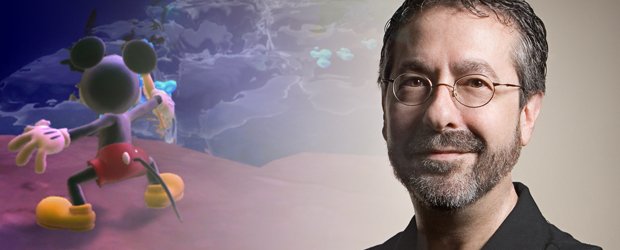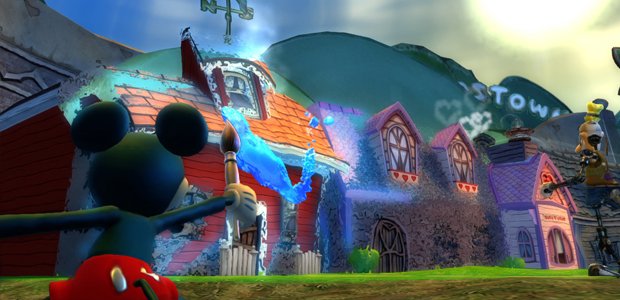An Interview with Warren Spector
"We are in a golden age, but make no mistake, it’s scary as hell."
He’s the guy who blessed gaming with the likes of Deus Ex, Thief, and System Shock. His university professor appearance is offset by the enthusiasm and energy of a wildly excited mind; the twinkle in his eyes and the grin on his face is unmistakable. He wrote the book on Mickey Mouse - well, the forward - and now, with Disney Epic Mickey 2 gathering momentum, Warren Spector is opening up on everything from the state of the industry, to working with the Mouse House, to heralding in a new golden age of gaming.

Let’s start with the original Epic Mickey - why was this the game that brought you back to game design since Thief in 2004?
You know, it’s funny. A lot of people ask me why I took that time off, but there was not one second off.
Here’s the thing: I left Ion Storm and Eidos in the spring of 2004, frankly because I felt out of place at that company. I was at E3 that year, and I remember looking around at all the games - I was showing Thief: Deadly Shadows, which I thought of as a slowly-paced, cerebral, genuinely mature sort of game. And I looked around and there was Crash ‘N’ Burn, the racing game about how big an explosion can you create, there was Hitman: Contracts, a game where this time you get to kill with a meathook, and over there was 25 to Life, a game about kids killing cops. I was like, oh my god, I can’t do this. So I left. I had six months off, but really, all I was doing in that time was planning my next thing.
I was an independent developer, and started Junction Point in January of 2005. I was working on an epic fantasy game for a publisher that decided they didn’t want to be in triple-A publishing anymore, so we’re starting over from scratch. That was nine months into the year. I’m going, alright, I need another deal, so I was doing some concept development for a filmmaker that I can’t talk about, and working with Valve on some stuff that I also can’t talk about, and then I got a deal to make a fantasy game called Sleeping Giants with another publisher - and then a year later they decided they weren’t. I mean, I was working non-stop on stuff! And then I was a year into working with John Woo on a project called Ninja Gold - we had a movie deal and a game deal - when the publisher we were working with pulled the plug. It was like a Black Sunday thing, they killed ten projects in one day. The board of directors of this company said any game that has been announced lives, and any game that hasn’t been announced dies.
Nine months of work and the publisher goes away, six more months and another publisher goes away, a year after that and another publisher goes away. And so I’m going, what the heck? I never took any time off - I was always out talking to publishers to get a deal.
"I never took any time off - I was always out talking to publishers to get a deal."
When you’re an independent developer sixish years ago, there was only one way to get a game done, and that was find a publisher to give you way too much money, put a game in a box, and put it on store shelves. Nowadays, it’s completely different. There are so many things: iOS games, Kickstarter, Steam... there are so many ways I could have done it if it happened now. But back then there was only one way.
Weekly digests, tales from the communities you love, and more
It was interesting, because I had a bunch of publishers interested in Sleeping Giants, my epic fantasy game, and in Necessary Evil, my near-future science fiction Deus Ex-with-the-serial-numbers-filed-off game, but my agent told me to talk to Disney. Now I’m the biggest Disney fan in the world, but I said no. They’re not going to be interested in Ninja Gold, they’re not going to be interested in Necessary Evil, they’re not going to be interested in Sleeping Giants. They’re just not. And he said “Just talk to them. They’re changing.” And they weren’t at all interested in what I was trying to make at the time, but they asked me if I was interested in doing a Mickey Mouse game. So picture yourself: huge Disney fan, sitting in a room full of Disney people surrounded by Disney-ish stuff, and they say “How would you like to play with the most recognisable icon on the planet Earth?” And I said no, because I don’t make games for kids - Disney, in my view, had done a very good job of positioning Mickey as a character just for kids. And they said “We want you to make the Mickey game that you want to make. Make Mickey a hero for the twenty-first century.”
At that point, I was sitting there, I was doing this (rocks back and forth on his chair), and I was trying to play it cool. That was kind of the start of it. There was no way you’d say no - I mean, if you were John Carmack making first person shooters, and someone said “How would you like to work with the most recognisable icon on the planet?”, and you said no? Come on. No one's going to do that. So I was in. I was there.

With regards to violence in games, you say the concept of its escalation made you part ways with Eidos. Yet back in the day, we were doing things like shooting asteroids with missiles, or shooting invaders from space. Violence has been one of the core elements in games since the beginning - was it not inevitable that things would increase to the state they have today?
Who knows what’s inevitable and what’s not? It happened, so trying to look back and say “was it inevitable”... I don’t know, you could say that, but I don’t know that I would. But the thing is, it’s very easy. For us to simulate the pulling of a virtual trigger is the easiest thing we could possibly do. We’re really, really good at that, because the medium is well-suited to that. But doing things because they’re easy doesn’t seem like a good reason to keep doing them.
Just to be clear, I’m not saying people shouldn’t make that kind of game, and I’m not saying people shouldn’t like them. I’m not saying any of that. I’m saying that what I saw at E3 this year crossed a line for me of taste. It’s not that “violence is bad” - I’m not that person! I’ve made plenty of violent games in my life. I play violent games. They don’t affect people in the way that a lot of people think they do. They just don’t. It’s demonstrably true that they don’t, and anybody who thinks they do is just not thinking. I mean, my mother thought that Bugs Bunny and The Three Stooges were going to destroy me. Whatever adults don’t understand, because they didn’t grow up with it, is the thing they’re going to be afraid of and try to legislate out of existence. It happened with videogames, it happened with television, it happened with pinball parlours and rock and roll. It happened before that with movies, it happened before that with novels. Do your history, folks - I could show you all of the 18th and 19th century articles about how children shoudn’t be reading about life, they should be out there living it. I could show you the contemporary reviews of Shakespeare who is this coney-catcher who thinks he can bombast out a blank verse; the Globe Theatre is a place for low-lives and pickpockets. Whatever adults don’t understand the kids love is what they’re going to be afraid of.
But when adults see kids cheering to a shotgun to the face on a big screen, what are they expected to understand from that? What needs to happen here?
It’s not for me to say what needs to happen, I just look at it as “I refuse to do that”. I don’t want to pander to that. For me, the issue at E3 wasn’t the content, it was the fact that that’s our one chance to talk to the world - to “normal” people, not gamers. And we didn’t show the breadth and variety of the content that we offer. Nintendo did some different stuff, but I just felt we crossed a line of bad taste. And that’s the only thing. I’m not judging people. I’m just saying let’s have some taste, and let’s show the incredible variety of the things that we offer players in this amazing medium that’s unlike anything else in the history of mankind.



